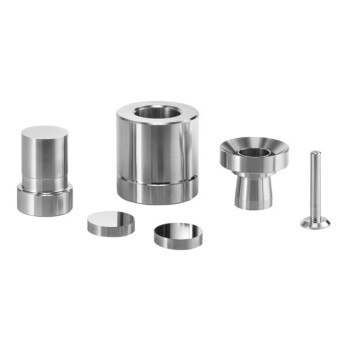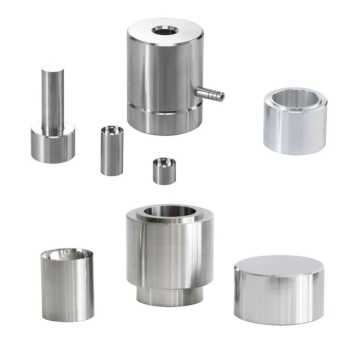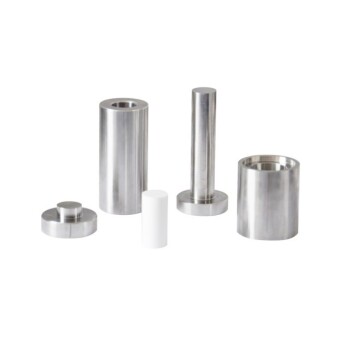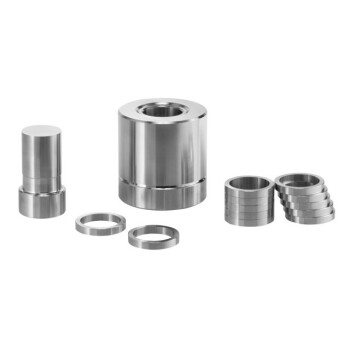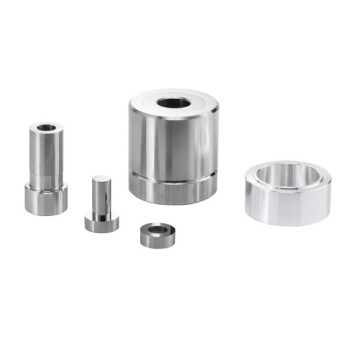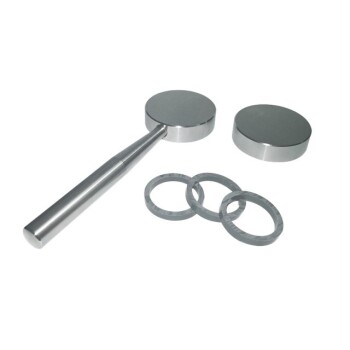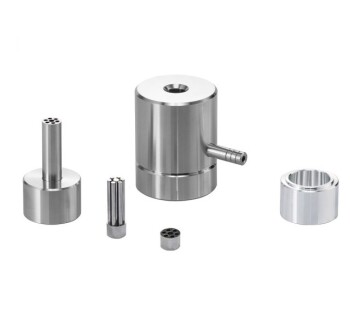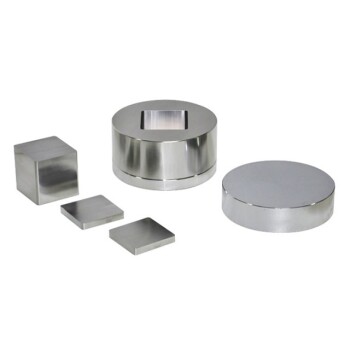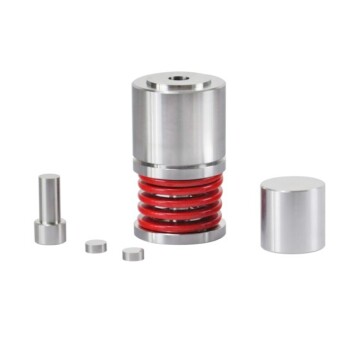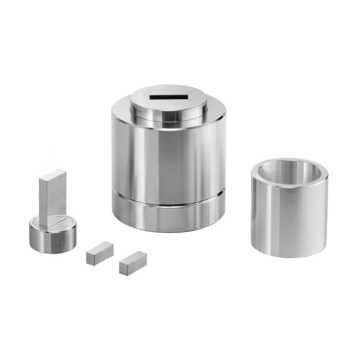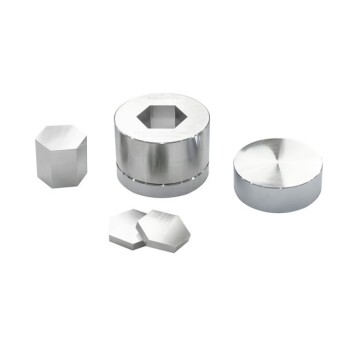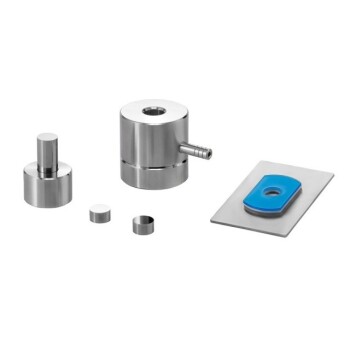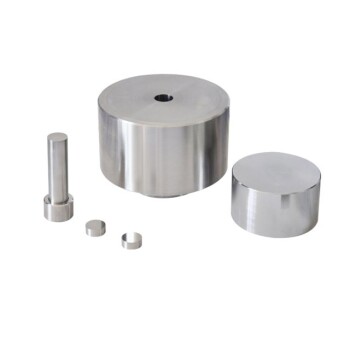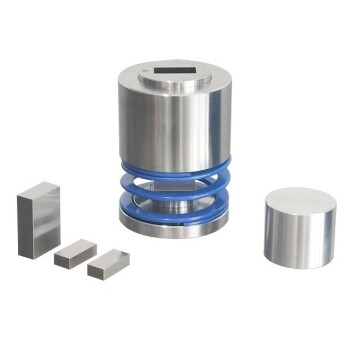At its core, a pellet press die is chosen based on three factors: the desired pellet shape, the properties of your sample material, and the specific experimental conditions required. The primary types available are standard hardened steel dies for common shapes, vacuum dies for controlled atmospheres, and specialized dies designed to handle problematic materials.
The selection of a pressing die is not a matter of preference but a critical technical decision. The right die ensures the integrity of your sample, the quality of your pellet, and the repeatability of your results.

Breaking Down the Core Die Categories
Understanding the function of each die type moves you from simply knowing the options to strategically selecting the right tool for your specific scientific or industrial goal.
Standard Dies: The Workhorses for Shape
The most common dies are defined by the final shape they produce. They are typically machined from hardened steel to withstand high pressures and resist abrasion from powdered samples.
- Cylinder Dies: These are the default choice for creating standard, cylindrical pellets used in a vast range of applications, from pharmaceutical tablets to materials analysis samples for techniques like X-ray fluorescence (XRF).
- Square Dies: Used when a square or rectangular final form factor is required. This can be for specific testing geometries or to maximize surface area for certain reactions.
Vacuum Dies: For Air-Sensitive or Porous Samples
A vacuum die is not about shape but about controlling the environment during compaction. It features ports that allow a vacuum pump to be connected, evacuating air from the die cavity.
This is critical for two reasons. First, it prevents the entrapment of air in porous materials, which can lead to cracked or weak pellets upon pressure release. Second, it allows for the pressing of air-sensitive or reactive materials in an inert atmosphere.
Specialized Dies: Solving Material-Specific Challenges
Sometimes, the sample material itself presents the biggest challenge. Specialized dies are engineered to overcome these issues.
A prime example is the trapezoidal split sleeve die. This die is designed for samples that are extremely sticky or have a high tendency to adhere to the die walls. Its sleeve can be split apart, allowing for easy, damage-free removal of the finished pellet.
Understanding the Critical Trade-offs
Choosing a die involves balancing performance, complexity, and cost. An incorrect choice can lead to failed experiments, damaged samples, or unnecessary expenses.
Simplicity vs. Functionality
Standard hardened steel dies are robust, simple to use, and cost-effective. They are perfect for a wide range of routine applications.
However, if your material traps air or is sticky, forcing it into a standard die will produce poor results. The added complexity and cost of a vacuum or split sleeve die are justified by the need for a successful outcome.
Material Integrity and Ejection
The primary goal is to create a perfect pellet. A standard die relies on the plunger to push the pellet out, which can place significant stress on the sample.
For fragile or adhesive materials, this ejection force can cause cracking or lamination. A split sleeve die eliminates this vertical ejection force entirely, protecting the pellet's structural integrity.
Cost and Maintenance
There is a direct correlation between die complexity and cost. Standard dies are the most affordable.
Vacuum dies are more expensive due to the additional machining for vacuum ports and seals. Split sleeve dies are often the most costly due to their precise, multi-part construction. They also require more careful handling and assembly to avoid damaging the interlocking surfaces.
Selecting the Right Die for Your Application
Use your primary objective to guide your decision. The correct tool will make your process more efficient and your results more reliable.
- If your primary focus is creating simple, standard shapes with non-problematic powders: A hardened steel cylinder or square die is the most efficient and cost-effective choice.
- If your material is porous, traps air, or is sensitive to oxygen: A vacuum die is non-negotiable to ensure pellet density and prevent unwanted reactions.
- If your sample is known to be sticky, adhesive, or fragile upon ejection: A split sleeve die is the correct tool to guarantee damage-free sample removal.
Ultimately, aligning the die's capabilities with your material's properties is the key to producing high-quality, consistent pellets every time.
Summary Table:
| Die Type | Key Features | Best For |
|---|---|---|
| Standard Dies | Hardened steel, simple shapes (e.g., cylinder, square) | Non-problematic powders, routine applications |
| Vacuum Dies | Controlled atmosphere, air evacuation | Porous or air-sensitive materials |
| Specialized Dies | Split sleeve for easy ejection | Sticky, adhesive, or fragile samples |
Need the perfect pellet press die for your lab? KINTEK specializes in lab press machines, including automatic lab presses, isostatic presses, and heated lab presses, designed to meet your specific needs. Our expert team can help you select the right die to enhance sample quality, improve repeatability, and boost efficiency. Contact us today to discuss your requirements and discover how our solutions can benefit your laboratory!
Visual Guide

Related Products
- Lab XRF Boric Acid Powder Pellet Pressing Mold for Laboratory Use
- Lab Ball Press Mold
- Lab Cylindrical Press Mold with Scale
- Lab Cylindrical Press Mold for Laboratory Use
- XRF KBR Steel Ring Lab Powder Pellet Pressing Mold for FTIR
People Also Ask
- What is the technical significance of the pressure-holding function in lithium-sulfur batteries? Enhancing Cell Performance
- What is the purpose of a laboratory press for rare earth concentrates? Achieve Precision in Sample Characterization
- What is the role of laboratory press pellets in spectroscopy? Achieve Peak Analytical Accuracy with Precision Samples
- What are the different types of XRF pellet preparation methods available? Manual, Hydraulic, and Automated Presses Explained
- What pressure and duration are typically required for pressing samples in XRF pelletising? Expert Guide for XRF Prep
